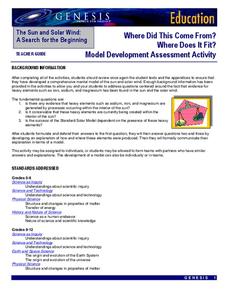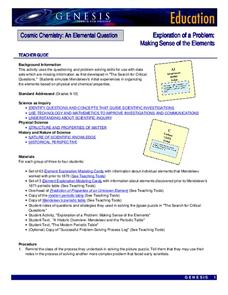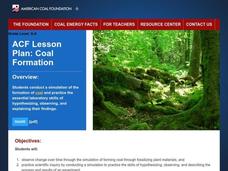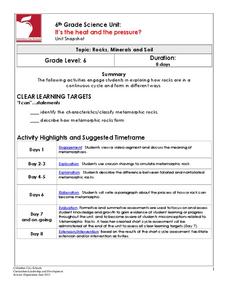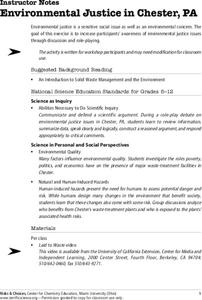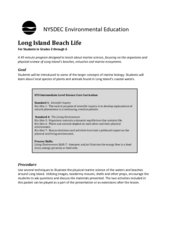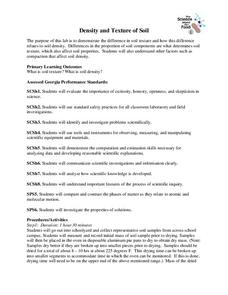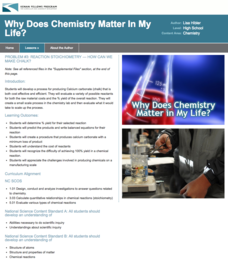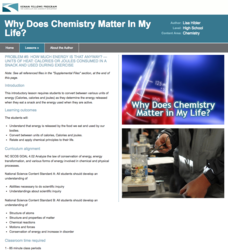NASA
Supernova Chemistry
By measuring the wavelength, frequency, and intensity of electromagnetic radiation, scientists determine the temperature, density, and composition of far away items. Scholars rotate through ten lab stations using a spectroscope at each...
NASA
What's the Frequency, Roy G. Biv?
While all light travels at the same speed, each color in the visible light spectrum contains a different wavelength and frequency. Scholars determine the relationship between frequency and wavelength as they complete the activity. They...
Discovery Education
Cushion It!
Sugar cubes, collide! Groups design protection systems using bubble wrap to protect sugar cubes from being destroyed by falling batteries in the STEM lesson plan. They consider how the experiment relates to collisions in real-world...
NASA
Model Development Assessment Activity
Time to show off what they've learned! The final lesson in the series of six asks young scholars to process their learning from the previous lessons. They identify possible elements of the sun as well as a possible origin.
NASA
Exploration of a Problem: Making Sense of the Elements
When given too much data to simply memorize, it helps to sort it into manageable groups. The second lesson in the six-part series of Cosmic Chemistry challenges groups of pupils to take a large amount of data and figure out how to best...
Curated OER
Perceived Risks
Young scholars rank a list of everyday risks to compare with classmates. They rate each risk on both its ability to be controlled and its observability in the environment. Results are graphed.
Curated OER
Coal Formation
Learners perform an in-depth study of coal - one of most important fossil fuels. Over a three-week period of time, they become familiar with how coal is formed underground, and will create a "fossil" right there in the classroom in order...
PBS
The History and Use of Sampling Methods
Young mathematicians define population, draw convenience sample from the population, draw quota sample from the population, and draw random probability sample from the population. They explain why a random probability sample usually...
Curated OER
Light and Elements
Here is a full-fledged investigation of light waves, the electromagnetic spectrum, and element spectra. Physicists research a scientist that contributed to our understanding of the behavior of light. They take notes on your lecture, and...
Curated OER
Changing Planet: Withering Plants - Stressing Over Lost Water
Expectant earth scientists examine the bottom side of a leaf and learn the role of the stomata. They consider the gas exchange that occurs through these structures and relate how the climate is changing to its impact on food crops. This...
Columbus City Schools
It’s All Relative
Are the people on the other side of the world standing upside down? Pupils discuss the relationship between movement and position words. The unit explores the concept of reference points through animation, modeling, photography, and...
Columbus City Schools
It's the Heat and the Pressure?
Ready for a change? Give a comprehensive collection of metamorphic materials a try! With the assortment of printables and lab activities, you won't be under pressure to keep things lively. The unit culminates by having...
University of Minnesota
What's the Deal? Addiction Card Game
Addiction is a big deal! Playing a game of cards helps learners understand the concept of addiction. Through their analysis, they examine the potential for addiction and how it varies for each individual.
Curated OER
Environmental Justice in Chester, PA
Over several days, learners communicate and defend an argument regarding environmental justice issues in Chester, PA. After discussing the issue and viewing a video about the location of several toxic waste facilities in Chester, they...
Curated OER
Lead and Mercury Ion Catalase Inhibition
Students participate in a laboratory investigation in which they observe the effect of temperature and pH on enzyme activity. Students also examine exposure to heavy metal ions and the effect that may have on enzyme activity.
Curated OER
Assessing Risks for Inhalation and Ingestion of Pollutants
High schoolers use a hypothetical scenario to investigate inhalation of an airborne pollutant and ingestion of a waterborne pollutant. They work in pairs, investigating differences in overall exposure to contaminants by calculating...
Curated OER
In Touch with Apples
Students read "How To Make an Apple Pie and See the World", the story of a girl who traveled the world to find the ingredients to make her apple pie. They conduct a series of interdisciplinary activities including testing their senses,...
Curated OER
The Five Classes of Vertebrates
What a terrific lesson plan! Learners discuss the animal kingdom, and classify them as vertebrates and invertebrates. They also identify them as fish, amphibians, reptiles, birds, and mammals. There is even a taxonomic breakdown of...
Curated OER
Long Island Beach Life
Have your class learn about marine life through this resource. This comprehensive lesson has learners discuss marine life, learn key vocabulary, discuss environmental concerns, and play games related to migration and predator/prey...
University of Georgia
Density and Texture of Soil
All soil is not created equal! A lab activity asks learners to collect and analyze soil. Specific calculations determine the amount of sand, silt, and clay in a sample and allow individuals to identify the soil texture.
Kenan Fellows
Reaction Stoichiometry—How Can We Make Chalk?
What is a reasonable percent yield in the manufacturing process? Scholars develop a process for producing chalk in the third lesson of a six-part series. Then, they must determine the theoretical and percent yield. Discussions about...
Kenan Fellows
What Is Heat?
If objects have no heat, how do they can gain and lose it? Scholars experiment with heat, temperature, and specific heat of various substances. They create definitions for these terms based on their own conclusions to complete the fourth...
Kenan Fellows
How Much Energy Is That Anyway?
The fifth lesson in the six part series introduces units of energy including calories, Calories, and joules. Scholars determine the energy released when eating a snack and during activity.
Kenan Fellows
How Much Heat Can a Phase Change Produce?
Scholars learn about heat release in phase changes. They perform calculations as they compare and contrast a science fiction passage and a home heating application.
Other popular searches
- Scientific Inquiry Lesson
- Scientific Inquiry Skills
- Scientific Inquiry Method
- Scientific Inquiry Health
- Scientific Inquiry Model
- Scientific Inquiry Process
- Scientific Inquiry Lab
- Scientific Inquiry Music
- Scientific Inquiry Questions
- Scientific Inquiry + Health
- Scientific Inquiry Experiments
- Scientific Inquiry and Design



